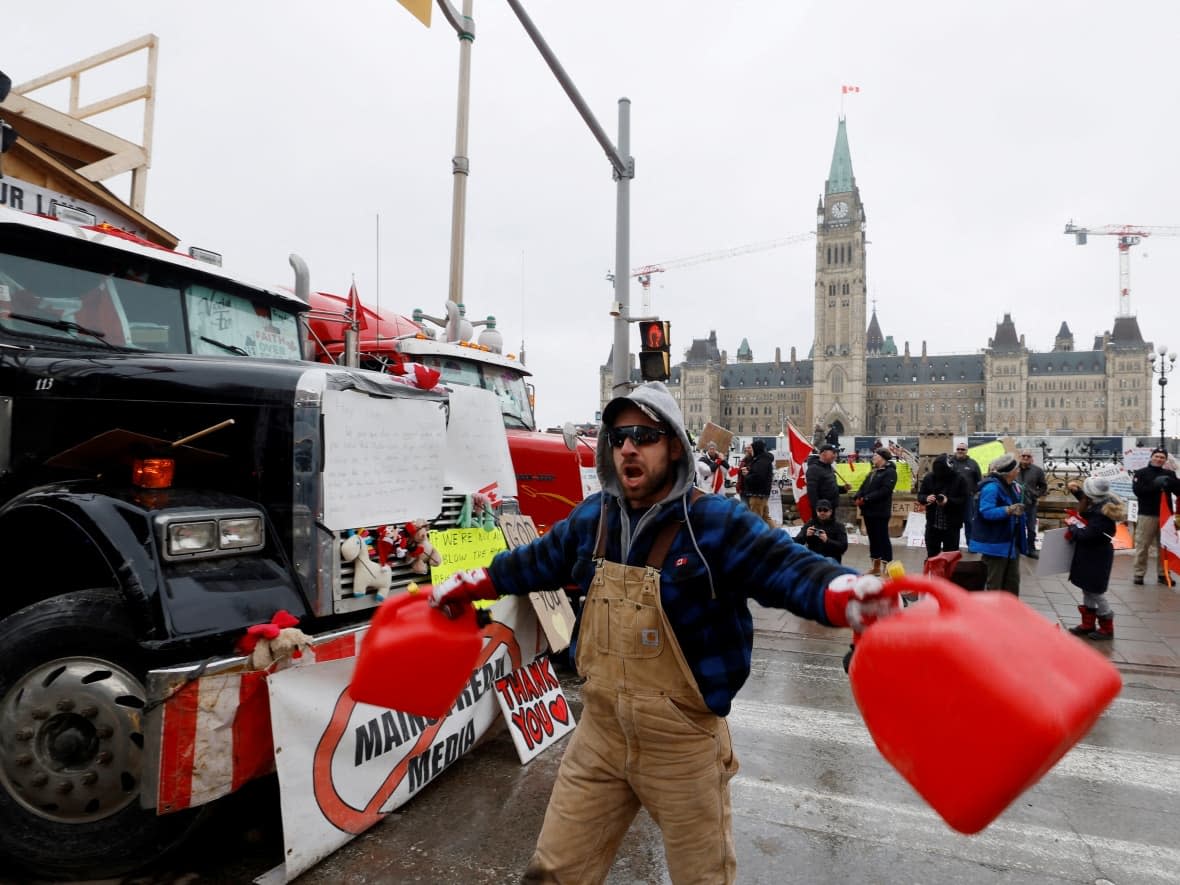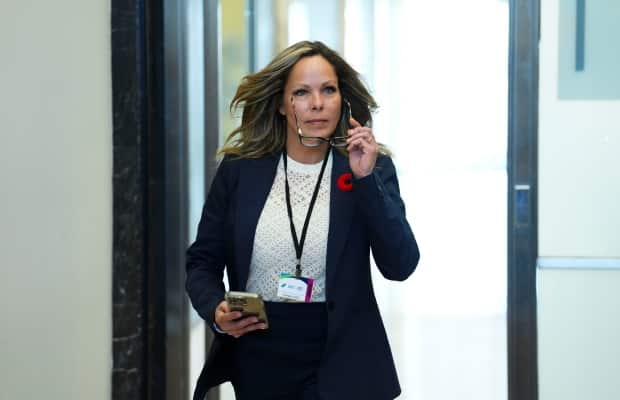Money flowed to convoy protesters through envelopes of cash, cryptocurrency campaign, inquiry hears

Millions of dollars raised by the self-styled "Freedom Convoy" was either returned to donors or is still tied up in court — but thousands of dollars went to convoy protesters through a cryptocurrency campaign and envelopes of cash, the Emergencies Act inquiry heard Thursday.
The Public Order Emergency Commission heard evidence this morning about donations to the protest made through e-transfers, cryptocurrency and fundraising platforms like GiveSendGo and GoFundMe.
Despite raising millions of dollars to support their cause through crowdsourcing sites, convoy organizers were prevented by court orders from accessing most of those funds.
But an overview report compiled by the Public Order Emergency Commission said that, starting on Jan. 27, an Ottawa man — Nicholas St. Louis — was able to raise about $1.2 million in cryptocurrency for convoy protesters through Tallycoin, a crowdfunding platform that allows individuals to donate small amounts of Bitcoin at no cost.
The commission is reviewing the circumstances that led to the federal government invoking the Emergencies Act to quell the crowds and vehicles that blocked Ottawa streets for weeks last winter.
The Honk Honk Hodl cryptocurrency campaign was able to distribute about $800,000, said the report, which was presented before the inquiry Thursday.
"This had been accomplished by handing out physical envelopes that contained instructions on how to access approximately $8,000 of Bitcoin using a mobile phone," it said.
WATCH | Commission lawyer explains protest convoy's finances:
The commission said about 100 electronic wallets were prepared and distributed on Feb. 16 to people participating in the Ottawa protests.
According to the report, St. Louis shut down the Tallycoin fundraiser on Feb. 14 and, in a Feb. 19 video broadcast on Twitter Spaces, said that that the bulk of the remaining Bitcoin was in a "multisig wallet" — a digital wallet that requires a minimum number of electronic "signatures" to authorize money transfers.
Cash handed out in envelopes, treasurer says
The commission's overview report also said many protest participants left cash donations at tents that were collecting money to purchase fuel and food. The report says that money was later taken to the Swiss Hotel in Ottawa, where Chad Eros, who acted as the treasurer for the convoy, was staying.
"A system was later put into place whereby the money was placed into numbered envelopes with $500 in each one. People would then sign out these envelopes and distribute them to truckers," said the report.
"Records were kept of the identities of the individuals who were given envelopes, and this information was tracked on a spreadsheet."

Eros told the commission that he estimates approximately $20,000 in cash flowed through the Swiss Hotel every day from the main stage donation collection.
He said a similar system was in place at another hub housed out of the ARC Hotel in downtown Ottawa.
"Mr. Eros did not have direct knowledge of the source of their funding, but understood that individuals would bring cash to the ARC hotel, which would be processed and placed into envelopes in the amount of $2,000 CAD before being distributed to protesters," the commission report said.
Mystery donor wanted to bring government to its knees: Eros
In his interview with the commission, Eros said that on Feb. 10 the leader of the Coventry Road protest camp called him to say a very wealthy and important businessman wanted to have a meeting with the Swiss Hotel protest leaders about a large donation.
"The businessman only spoke French and required an interpreter. He proposed donating $500,000 in fuel in exchange for his brand to be all over the protest," says a summary of that interview.
"He also wanted the Convoy organizers to order the truckers to blockade the Canadian borders and bring the government down to its knees."
Eros told the commission he spoke up at that point to state that the convoy was a protest and he did not want anything to do with the prospective donor's plan.
The accountant-turned-convoy treasurer said everyone in the room at the time suspected the businessman was an agent provocateur or a government plant because his proposal was so ridiculous and incriminating, says his interview summary.
Lich says managing the money became overwhelming
The report also explained how most of the millions of dollars raised by protesters online ended up in an escrow account or returned to donors.
One of the movement's more high-profile fundraisers was a GoFundMe campaign launched by Tamara Lich, one of the primary spokespeople for the protest.
Lich told the inquiry on Thursday that she was "blown away" once the campaign hit the $1 million mark. The GoFundMe page would eventually top $10 million.
"It was very exciting and exhilarating, of course, but at the same time, I would just feel myself almost getting more and more anxiety," she said.
WATCH | Tamara Lich testifies at the Emergencies Act Inquiry:
"Because from my view, when you're talking that kind of money, the lawyers are coming. And here we are today."
She said that as the protest went on, managing the money became an overwhelming responsibility.
"I felt that some people didn't see me, they just saw $10 million over my head," said Lich, who added that it felt like vultures circling.
"Everybody wanted to know about the money."
The commission report showed that most of the money raised for the protest was Canadian in origin.
Millions of dollars frozen, returned
According to information provided by GoFundMe to the commission, the self-styled Freedom Convoy 2022 campaign had 133,836 donors. About 86 per cent of those donations — 107,000 — originated in Canada.
The site said 14,000 donors were in the United States.
GoFundMe suspended the page over concerns that the convoy protest had violated its rules on violence and harassment, according to a commission report presented on Thursday morning.
It says about 93 per cent of all donations to the "Freedom Convoy 2022" campaign had been refunded. The remaining refunds are either awaiting settlement or — in the case of 144 donations — are subject to chargebacks or disputes.
According to court documents, $1 million that was disbursed to Lich's TD Bank account was frozen and ultimately paid into escrow.
After GoFundMe shut down the convoy campaign, fundraising shifted to another crowdfunding platform — GiveSendGo, which bills itself as a "Christian fundraising site."
According to information provided to the commission by GiveSendGo the "Freedom Convoy 2022" campaign it hosted received donations from 113,152 donors totalling $9,776,559 US.
On Feb. 10 the Ontario Superior Court of Justice granted a request from the provincial government to freeze access to millions of dollars donated online throughGiveSendGo.
A court also granted what's known as a Mareva injunction on Feb. 17 on behalf of Ottawa residents pursuing a proposed class action lawsuit against convoy leaders and protesters. That injunction froze millions of dollars in cryptocurrency and other financial donations to the protest.
As part of that injunction, an escrow agent was appointed to receive and hold the frozen funds.
Outside of the crowdfunding sites, Lich accepted e-transfers to TD Bank accounts.
During the Mareva court proceedings, Lich said that — of the $26,000 withdrawn from those accounts — $10,000 went to pay a bulk fuel supplier called fillerup.ca, $3,000 went to pay to a bulk fuel supplier in Quebec and $13,000 was withdrawn in cash and used for "various purposes."
Ottawa residents, business associations, officials and police have testified already at the public hearings. The hearings are expected to continue until Nov. 25 and culminate with testimony from federal leaders, including Prime Minister Justin Trudeau.


